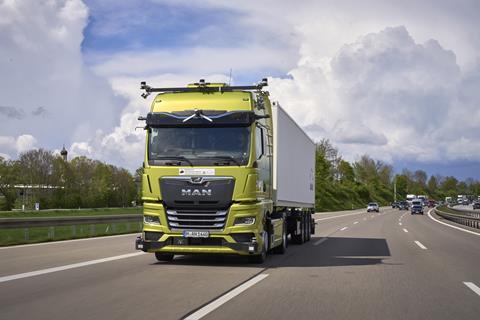Truck drivers have raised concerns about the safety of driverless HGVs, with unpredictable weather, navigating rural roads and other motorists chief among their worries.
Their fears were raised following an announcement earlier this year that MAN was testing autonomous HGVs on a German motorway.
The truck manufacturer has invested in the development of autonomous trucks for use in logistics hubs and for hub-to-hub traffic on motorways and it became the first CV manufacturer to receive a Level 4 test permit based on the law on autonomous driving on German motorways.
It said amid ever-increasing volumes of transport and a worsening shortage of drivers, driverless trucks could help to alleviate the situation.
But research carried out by digital marketplace SNAP discovered HGV drivers harboured different views about the technology’s rollout.
SNAP asked drivers for their opinions on MAN’s trial and found many debating whether the current technology was at a reliable standard.
It quoted one driver as saying: “In the slightest bit of rain, my truck loses all automatic capabilities, AEBS, and cruise control. There is no way trucks will be allowed to drive themselves without a driver anytime soon.”
Another stated: “This will kill more people on the roads and cause more queues. Just think how reliable your electronics are on your Euro-6 vehicle. The same people are making autonomous trucks.”
Others questioned how the HGVs would cope with unforeseen circumstances: “Wait until it’s trying to deliver with the wrong postcode,” one driver pointed out.
“It happens at least once a week. And, what about those older and smaller industrial estates with all the cars blocking that narrow road you’ve got to reverse down?”
Another asked: “What happens when it needs to go down a small country road and onto farmland or, even worse, farmyards?”
SNAP said the safety concerns were valid as AI systems evaluating and calculating large amounts of data in real time meant they needed to be highly sophisticated.
It added that a 2020 survey reported that malware and ransomware attacks had increased by 358% and 435% respectively, suggesting that cyber threats could turn critical.
But SNAP also pointed out that 99% of all accidents occurred due to human error and that increasingly sophisticated AI systems could reduce road traffic accident rates.

Matthew Bellamy, SNAP MD, said: “As an industry, we must recognise the positive consequences autonomous trucks will have on the sector - improved safety, more sustainability, and overcoming worker shortages, just to name a few.
“Concerns from HGV drivers and other road users are valid with such a significant change.
“However, as more safety legislation is introduced, autonomous trucks have the potential to make a positive impact on the industry.”
MAN was unable to respond to our requests for a comment.














